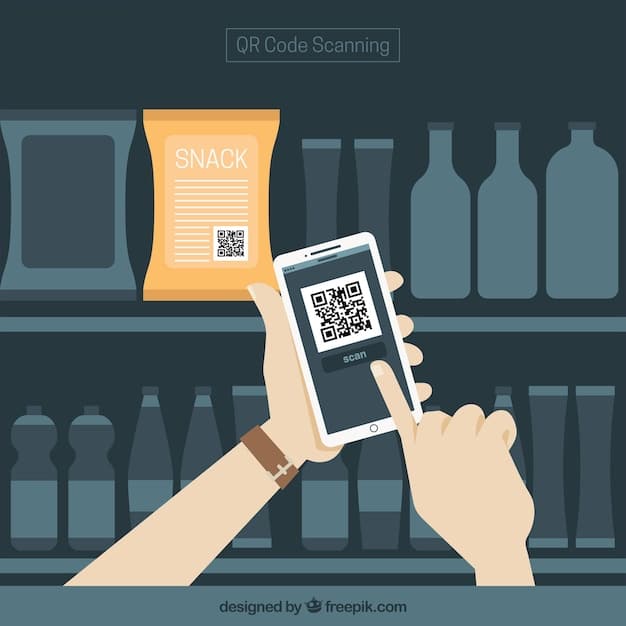Blockchain in Supply Chain: How US Firms Drive Efficiency

Blockchain technology is transforming supply chain management for US companies by enhancing transparency, security, and efficiency through decentralized, immutable records.
The world of supply chain management is undergoing a dramatic transformation, and at the heart of this revolution is blockchain technology: How US Companies Are Using It to Improve Supply Chain Management. Imagine a system where every transaction, every product movement, and every certification is recorded on a secure, transparent, and tamper-proof ledger.
The Basics of Blockchain Technology
Blockchain technology has moved beyond its initial association with cryptocurrencies like Bitcoin. Now, US companies are discovering its potential to revolutionize various industries. But what exactly is blockchain, and how does it work?
At its core, blockchain is a distributed, decentralized, public ledger. This means that instead of relying on a single authority to verify and record transactions, blockchain relies on a network of computers. Each transaction is grouped into a “block,” which is then linked to the previous block, creating a chain.
Understanding Key Concepts
To fully grasp blockchain’s application in supply chain management, it’s important to first understand some key concepts:
- Decentralization: No single entity controls the network, making it more resilient to manipulation.
- Transparency: All participants can view the blockchain, enhancing trust and accountability.
- Immutability: Once a block is added to the chain, it cannot be altered or deleted, ensuring data integrity.
- Smart Contracts: Self-executing contracts that automate processes based on predefined conditions.
These features make blockchain an ideal solution for addressing some of the most pressing challenges in supply chain management, from tracking products to verifying authenticity.
Enhancing Transparency and Traceability
One of the biggest advantages of blockchain in supply chain management is its ability to enhance transparency and traceability. Today’s supply chains are complex, often involving multiple suppliers, manufacturers, distributors, and retailers. This complexity can make it difficult to track products and verify their origin.
With blockchain, every step of the supply chain can be recorded on the ledger, creating a complete and transparent history of the product’s journey. This includes information such as:

- Origin of raw materials
- Manufacturing process
- Distribution channels
- Storage conditions
This level of transparency can help US companies build trust with consumers, reduce the risk of fraud, and improve their ability to respond to recalls or other supply chain disruptions.
Improving Efficiency and Reducing Costs
Beyond transparency, blockchain can also help US companies improve efficiency and reduce costs in their supply chain operations. By automating processes, eliminating intermediaries, and reducing paperwork, blockchain can streamline operations and free up resources. Here’s how:
Automated Processes
Smart contracts can automate many of the manual processes involved in supply chain management. They can automatically trigger payments when goods are received or automatically update inventory levels as products move through the supply chain.
Reduced Intermediaries
Blockchain can eliminate the need for intermediaries, such as banks or escrow services, by providing a secure and transparent platform for transactions. This can significantly reduce transaction costs and speed up the payment process.
Reduced Paperwork
By digitizing supply chain documents, blockchain can reduce the amount of paperwork involved in each transaction. This can save time, reduce errors, and improve overall efficiency.
The result is a more agile and responsive supply chain that can adapt quickly to changing market conditions.
Ensuring Product Authenticity and Preventing Counterfeiting
Counterfeiting is a major problem for US companies, costing billions of dollars each year. Blockchain can help combat counterfeiting by providing a secure and transparent way to verify the authenticity of products. For many companies, the authenticity of their products is as important to their customers as the quality of the product itself.
By recording the unique identifier of each product on the blockchain, companies can track its movement through the supply chain and ensure that it is not being tampered with. Consumers can then use a smartphone app or other tool to scan the product’s identifier and verify its authenticity.

This level of traceability can help US companies protect their brand reputation, reduce the risk of liability, and provide consumers with greater confidence in the products they are buying.
Challenges and Considerations
While blockchain offers many potential benefits for supply chain management, it’s important to acknowledge the challenges and considerations involved in implementing this technology. Potential hurdles include:
- Scalability: Some blockchain networks may struggle to handle the large volume of transactions required for certain supply chains.
- Interoperability: Different blockchain networks may not be compatible, making it difficult to share data across different parts of the supply chain.
- Regulation: The regulatory landscape for blockchain is still evolving, which can create uncertainty for companies considering using this technology.
- Data Privacy: Ensuring privacy of sensitive data.
Despite these challenges, many US companies are already experimenting with blockchain in their supply chain operations, and the number is expected to grow in the coming years. As the technology matures and the regulatory landscape becomes clearer, blockchain is likely to become an increasingly important tool for managing complex supply chains.
Examples of US Companies Using Blockchain in Supply Chains
Several US companies are already leveraging blockchain technology to improve their supply chain management. One notable example is Walmart, which uses blockchain to track the origin of its produce. Specifically, Walmart has successfully used blockchain to track mangoes from farm to store, reducing the time it takes to trace a product from days to just seconds.
Other US Companies Embracing Blockchain
- IBM Food Trust: A blockchain-based platform that helps companies track and trace food products through the supply chain.
- Maersk: A shipping company that uses blockchain to manage and track shipments of goods around the world.
- Provenance: A company that uses blockchain to verify the authenticity and sustainability of products.
These are just a few examples of how US companies are using blockchain to improve their supply chain management. As more companies experiment with this technology, we can expect to see even more innovative and transformative applications in the years to come.
| Key Point | Brief Description |
|---|---|
| 📦 Transparency | Enhanced tracking of products throughout the supply chain. |
| 🔒 Authenticity | Verification of product origin and prevention of counterfeiting. |
| ⏱️ Efficiency | Automation of processes and reduction of intermediaries. |
| 💰 Cost Reduction | Decreased operational expenses through streamlined processes. |
Frequently Asked Questions (FAQ)
Blockchain is a decentralized, distributed, and immutable ledger technology used to record transactions across many computers. This technology ensures that data is secure, transparent, and resistant to alteration.
Blockchain enhances supply chain management by providing transparency, improving traceability, ensuring product authenticity, reducing fraud, and automating processes, enhancing operational efficiency.
Major benefits include increased transparency, better product traceability, enhanced product authenticity, reduced counterfeiting, and improved operational efficiency leading to cost savings.
Challenges include scalability, interoperability issues, regulatory uncertainties, and ensuring data privacy and security across all participants in the blockchain network.
Companies like Walmart, IBM Food Trust, and Maersk are using blockchain to track produce, manage food supply chains, and monitor global shipping, thereby improving overall supply chain efficiency.
Conclusion
In conclusion, blockchain technology is poised to revolutionize supply chain management for US companies by enhancing transparency, security, and efficiency. While challenges exist, the potential benefits are significant, making it a transformative tool for the future of supply chains.